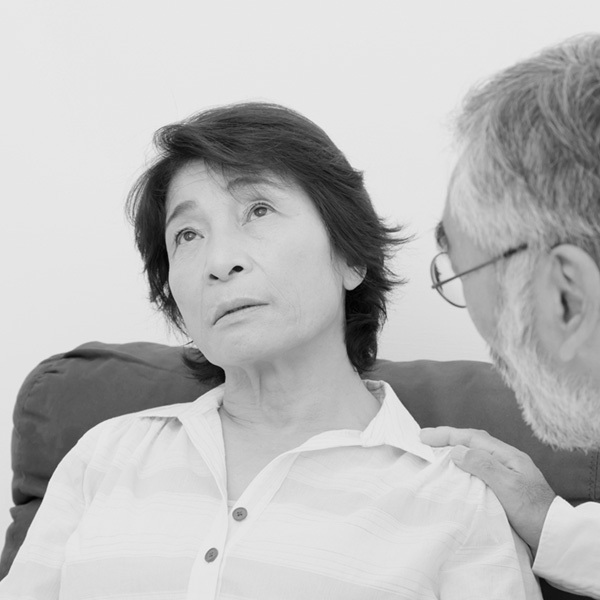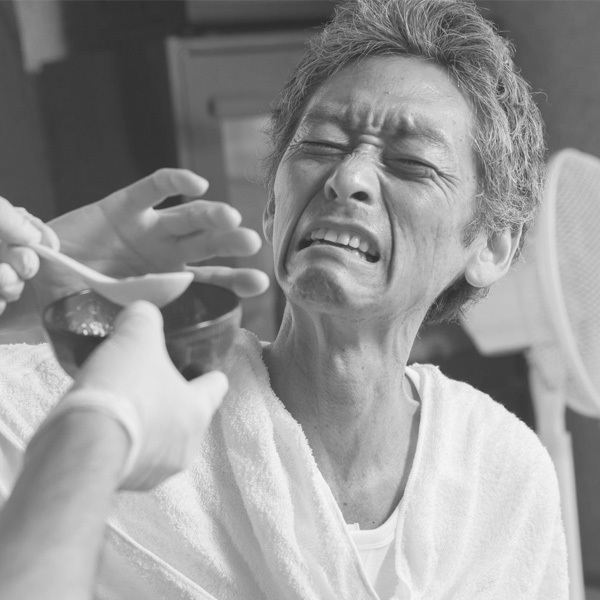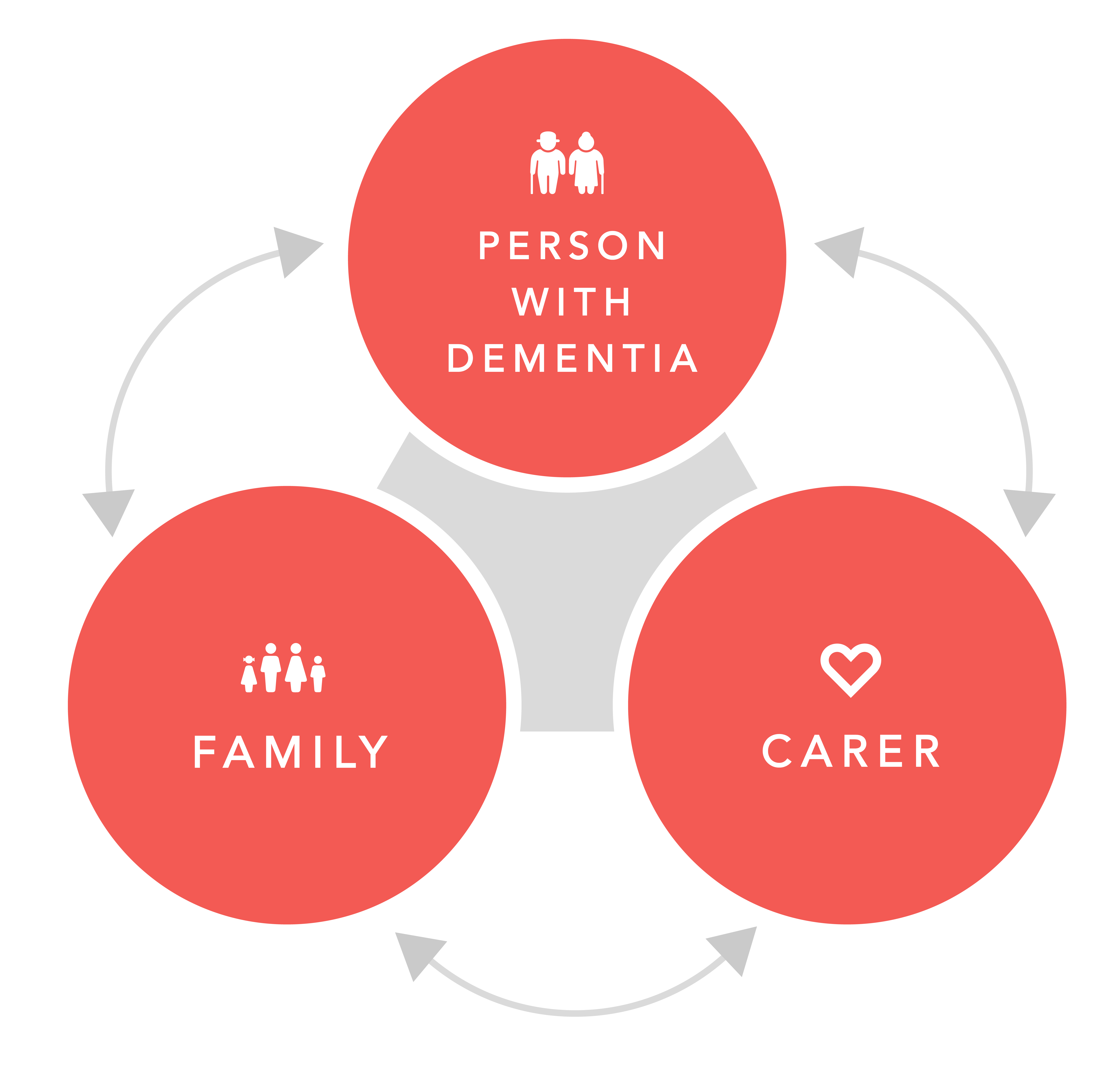Person Centred Care
Person-centred care (PCC) is an integrated and holistic approach to dementia care that focuses on addressing the psychological needs of people with dementia in order to maintain well-being and quality of life. It emphasizes preserving communication, relationships and the sense of personhood of the person with dementia and is now well-established as best practice for dementia care. However, the effectiveness of interventions to support PCC critically depend not only on the unique characteristics of the person with dementia, but also the ability of the carers to implement them, which can often be challenging to achieve in routine care.
-
 depression
depression -
indifference

-
 excitement
excitement
Responsive Behaviours in dementia
Previously known as behavioural and psychological symptoms of dementia (BPSD), responsive behaviours is a collective term used to describe behaviours such as agitation, irritability, apathy, delusions, hallucinations, depression and wandering that are often encountered when caring for people with dementia. Responsive behaviours cause significant distress to people with dementia as well as their families and caregivers, and often lead to premature institutionalization as well as increased care burden and medical cost. Currently there are no generally effective or safe drug treatments for responsive behaviours.
Impact on the Dementia Care Triad
- Behaviour and psychological changes associated with dementia
- dementia care triad
Responsive behaviours are closely linked to the dementia care triad. When responsive behaviours appear in well-functioning triads, they may disrupt the ability of the triad to maintain good care. Also, in some cases, inadequately functioning triads may lead to the emergence of responsive behaviours. Thus, creating and maintaining strong triad partnerships are vital to implementing person centred care, managing responsive behaviours and enabling sustainable dementia care.

Aikomi Concept
- Personalized cognitive stimulation and meaningful engagement -
Our technology platform is based on the concept of cognitive stimulation therapy (CST) which uses multisensory stimulation to promote meaningful communication and engagement with people with dementia. CST is usually implemented as group therapy by trained therapists, and we have created a technology platform to enable cognitive stimulation to be provided at the personal level by usual carers and families. Our platform works by using AI models to automate the processes to select contents, create programs and analyse the responses to programs of the person with dementia. However, our aim is not to completely automate everything, but to provide choices of candidate stimulation programs for family members and carers to select according to their preference and interests. In this way, people without specialist expertise or training can regularly use individualised cognitive stimulation interventions as part of their routine care activities, which we hope will become an intrinsically enjoyable activity for them as well as the person they are caring for.
-
1
Stay Focused
-
2
Facilitate Communication
-
3
Reduce Anxiety
-
Evidence
Aikomi is committed to generating high quality, real-world evidence to support the scientific development of our technology. As well as using established clinical scales as reference, we are investigating use of exploratory scales and direct monitoring data that can routinely evaluate quality of life in daily care. We have previously conducted feasibility studies with academic partners in Japan and Australia which indicated that our technology had potential to improve communication and engagement for people with dementia. We are currently conducting further studies in the US and preparing to conduct a clinical trial in Japan in collaboration with Pharma to create a regulatory approved person cantered digital therapy for dementia.
References
- Person Centered Care (PCC) McGreevy J. et al. (2015) Dementia and the person-centred care approach Nursing Older People, 27, 27-31
- Responsive behaviours (BPSD) Dupuis, S. et al. (2012) Pathologizing behavior; Meanings of behaviors in dementia care. Journal of Aging Studies, 26 (2), 162-173.
- Triad Care Fortinsky, R.H. (2001) Health care triads and dementia care: integrative framework and future directions Aging & Mental Health, 5 (Supplement 1): S35–S48
- BPSD Treatment Corbett, A. et al. (2012) Treatment of Behavioral and Psychological Symptoms of Alzheimer’s Disease. Current Treatment Options in Neurology. 14, 113-125.
- BPSD Treatment and Prevention Corbett, A. et al. (2015) Evidence-Based Treatment and Prevention of Behavioural and Psychological Symptoms of Alzheimer’s Disease. Frontiers in Clinical Drug Research – Alzheimer Disorders, 3, 115-134.
- Cognitive Stimulation Therapy (CST) Rai, H. et al. (2017) Cognitive Stimulation Therapy for Dementia. Clinical Geriatric Medicine, 34, 653-665.
- Astell A, Bouranis N, Hoey J, Lindauer A, at al.: Technology and dementia: the future is now. DEMENTIA AND GERIATRIC COGNITIVE DISORDERS 47:131–139 (2019)
- Hoel V, Feunou C, M, Wolf-Ostermann K. Technology-driven solutions to prompt conversation, aid communication and support interaction for people with dementia and their caregivers: a systematic literature review. BMC geriatrics 21: 1-11 (2021)


